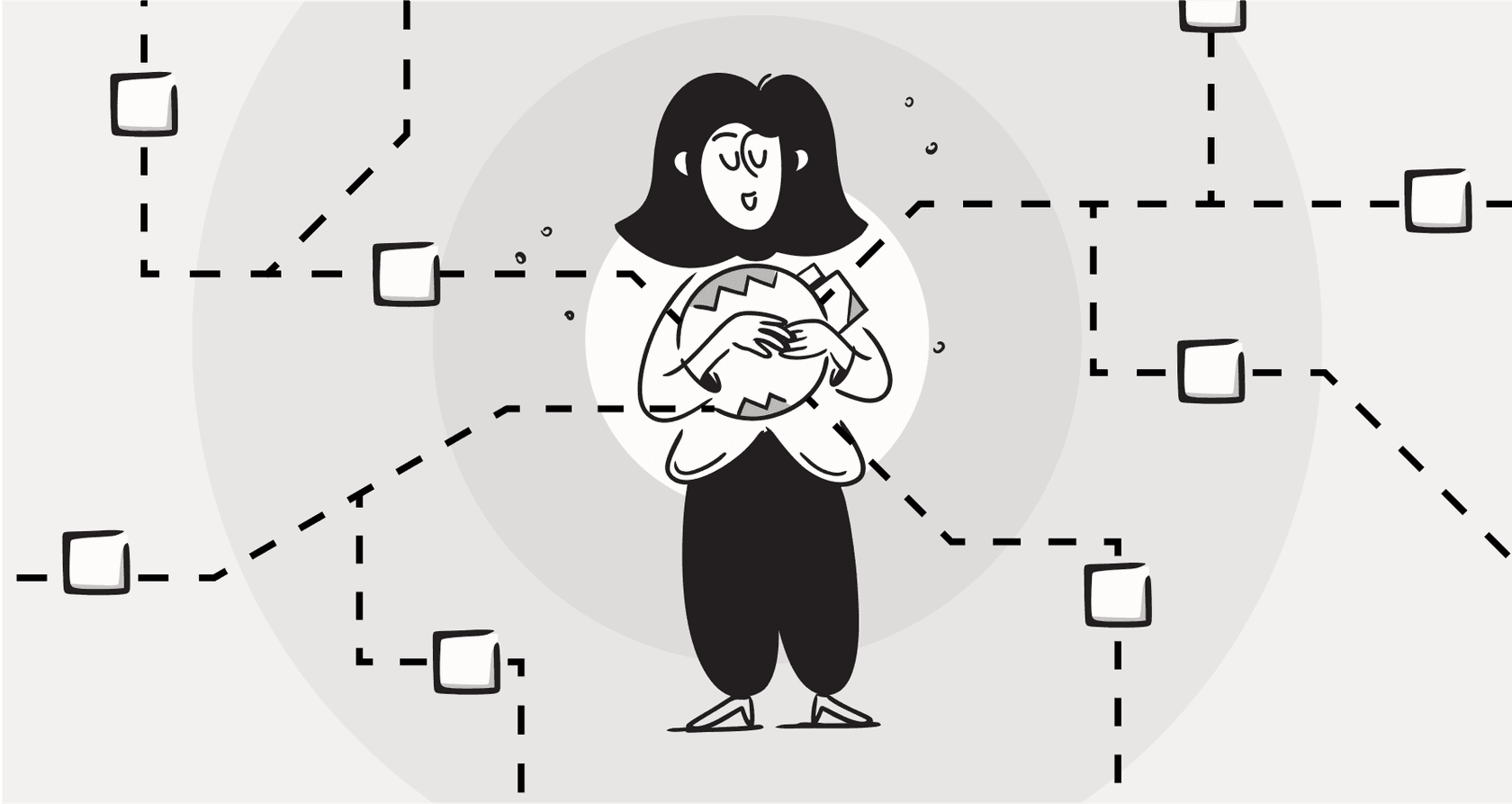
Running a Shopify store is amazing. But then you grow, and suddenly your inbox is a chaotic mess of "Where is my order?", "How do I make a return?", and "Do you have this in blue?" Sound familiar? What used to be your passion project now feels like you're constantly just trying to keep your head above water.
If you're nodding along, it’s probably time to get some better tools. A dedicated customer service app can take that chaos and turn it into a smooth, efficient part of your business that actually keeps customers coming back. This guide will walk you through the best Shopify customer service apps for 2026, helping you figure out which one is the right fit to manage conversations, automate replies, and turn good service into loyal fans.
What are Shopify customer service apps?
So, what exactly are these apps? Think of them as a central hub for every single customer conversation. Instead of bouncing between your email, Instagram DMs, and Facebook Messenger, these tools pull everything into one clean dashboard that works with your Shopify store.
But they do more than just organize messages. They also give you the full picture of who you're talking to. When a customer gets in touch, you can instantly see their order history, shipping status, and any past chats you’ve had. This means your team can give fast, accurate answers without having to hunt around for information. Plus, many of them now have smart automation and AI features to handle the simple, repetitive questions for you.
How we picked the best Shopify customer service apps
The Shopify App Store has a ton of options, and honestly, it can be a bit much. To cut through the noise, I focused on what actually matters for a growing store. Here’s the checklist I used to pick the apps for this list:
- A deep connection with Shopify: The app had to do more than just plug into the store. I looked for tools that pull in detailed order data and let you do things like process refunds or check on an order right from the support ticket.
- Smart AI and automation: The best tools use AI to take work off your plate. I prioritized apps that can automate answers to common questions, route tickets to the right person, and even learn from your team’s past responses to stay on-brand.
- Simple setup and use: You don't have months to spend on a complicated rollout. The apps on this list are known for being user-friendly, and some can be up and running in just a few minutes.
- Support for multiple channels: Your customers will message you from wherever is easiest for them. I chose apps that bring together conversations from email, live chat, social media, and more into one place.
- Clear pricing: E-commerce budgets can swing wildly. I leaned toward apps with straightforward, scalable pricing that don't hit you with hidden fees, especially those that don't charge you more for successfully helping more customers.
A quick comparison of the top Shopify customer service apps
Here’s a quick look at our top picks. Each one has its own strengths, whether you're a one-person shop just getting started or a bigger brand looking to use AI to scale your support. This table should give you an idea of which tool might fit your store best.
| App | Best For | Key AI Feature | Pricing Model | Ease of Setup |
|---|---|---|---|---|
| eesel AI | Instant, self-serve AI automation | Learns from past tickets & Shopify data | Flat-rate (no per-resolution fees) | Minutes (self-serve) |
| Gorgias | Deep Shopify-native workflows | AI-powered macros & ticket summaries | Tiered ticket plans | Professional guided setup |
| Tidio | Proactive live chat & lead gen | Visual chatbot builder (Lyro AI) | Per-user + AI usage | Easy |
| Richpanel | Building self-service portals | AI-powered self-service scenarios | Per-user | Moderate |
| Shopify Inbox | Free, basic live chat | AI-generated suggested replies | Free (included with Shopify) | Very Easy |
| Zendesk | Teams needing enterprise-grade features | Advanced AI agents for seamless support | Per-user tiered plans | Comprehensive |
The 6 best Shopify customer service apps in 2026
Alright, let's get into the details of each app. We'll look at their key features, what they do well, where they fall short, and how much they cost.
1. eesel AI
eesel AI is a bit different. It’s not another helpdesk you have to move your whole team to. Instead, it’s like a complementary AI brain you plug into the tools you already use. It connects to your Shopify store, your helpdesk (like Gorgias or Zendesk), and other places you keep information, like Google Docs or past tickets. Once it's set up, its AI Agent can answer questions, sort tickets, and even look up order details on its own.
The thing that really clicked for me with eesel AI was how easy it is to get started without any risk. You can sign up and have a basic AI agent running in minutes, no sales call required. Before you even turn it on for customers, you can run simulations on your past support tickets to see exactly how the AI would have answered. This gives you a clear picture of its performance and lets you roll out automation slowly, starting with the questions you're confident it can handle.
Pros:
- Super easy, self-serve setup that gets you live in minutes.
- Clear, predictable pricing that doesn't charge you per ticket resolved.
- Brings together knowledge from everywhere (Shopify, old tickets, documents).
- A powerful simulation mode lets you test everything before going live. Cons:
- It's designed to make an existing helpdesk smarter, not to be a standalone inbox.
- It's a newer platform, so they're adding new features all the time. Pricing: Plans start at $239/month (when billed annually) and include all the core features.
2. Gorgias
Gorgias is a premier choice for e-commerce, and its connection with Shopify is incredibly tight. We're talking about being able to see a customer's entire order history, process a refund, or edit an order without ever leaving the conversation. Having all that context right there makes it so much faster for teams handling tricky order-related questions.
The platform pulls in support requests from email, live chat, phone, and social media, and you can even reply to comments on your Facebook and Instagram ads. It has an automation feature called "Rules" that lets you tag, assign, or send automatic replies based on what the ticket is about. For example, you can set it up to automatically close "where is my order?" tickets by sending back the tracking info.
Pros:
- The best Shopify integration out there, with tons of customer data and order actions.
- Great for managing social media comments and DMs.
- Designed specifically with the needs of e-commerce brands in mind. Cons:
- Gorgias offers tiered plans based on ticket volume, which provides a scalable model that grows with your business needs.
- Their team provides tailored demos to ensure the platform is optimized for your specific store from day one. Pricing: Starts at $10/month for 50 tickets, with plans going up as your ticket volume increases.
3. Tidio
Tidio is all about making your live chat work harder for you, turning it into a tool that doesn't just answer questions but also makes sales. While it can handle email and social media, its real power is in its chat widget and AI-powered chatbots. Tidio has a visual chatbot builder that makes it surprisingly easy for anyone to create automated chat flows without knowing how to code.
These chatbots can do things like greet new visitors, offer discounts, nudge people who have abandoned their carts, and answer common questions 24/7. Tidio's AI, called "Lyro," can read your FAQ page to have more natural conversations. This focus on proactive chat makes it a great choice if you want to turn more website visitors into customers while still handling basic support.
Pros:
- A very intuitive visual chatbot builder.
- Has a solid free plan to get you started with live chat.
- Excellent for driving sales and capturing leads on your storefront. Cons:
- The price can climb quickly once you add more agents and unlock the advanced AI features.
- It’s not as full-featured for managing all channels as some competitors. Pricing: A free plan is available. Paid plans start at $29/user/month.
4. Richpanel
Richpanel's whole philosophy is "let customers help themselves." Its best feature is a self-service portal you can customize to look and feel like your brand. It works a lot like Amazon's "My Orders" page, where customers can log in to track packages, start a return or exchange, change their shipping address, or cancel an order without ever having to talk to a person.
By handling a huge chunk of those common questions, Richpanel frees up your team to focus on more complicated problems. It also has a multi-channel helpdesk for the conversations that do need a human touch, along with some AI features to help agents reply faster. The platform gives you good data on what your customers are asking, which can help you spot gaps in your help center.
Pros:
- Strong self-service portal that cuts down on agent workload.
- Clean, modern design for both customers and agents.
- Good AI tools for both self-service and agent support. Cons:
- Pricing is per user, so it can get pricey if you have a larger team.
- The main focus is self-service, so it might not be the best pick if you need robust live support. Pricing: Plans start at $29/user/month.
5. Shopify Inbox
If you're just starting out, Shopify Inbox is a great first step into customer service. It's Shopify's own tool, it's completely free, and it's already built into your admin dashboard. It lets you add a simple chat widget to your store so you can have real-time conversations with shoppers.
Shopify Inbox is basic, but it gets the job done. You can save responses for frequently asked questions, get AI-suggested replies, and share products or discount codes right in the chat. It doesn't have the advanced automation or analytics of the paid tools, but it's a fantastic way to get your customer chats organized and move away from using a personal email address.
Pros:
- It’s completely free with any Shopify plan.
- Already integrated and super easy to set up.
- A clean and simple way to manage live chats. Cons:
- Features are very limited: it won't scale with your store.
- Lacks real automation and can't manage channels other than chat and email. Pricing: Free.
6. Zendesk
Zendesk is one of the giants in the customer service world, and for good reason. It’s a mature, reliable platform that powers customer service for thousands of companies globally. Its Shopify integration allows agents to see customer and order info seamlessly within the powerful Zendesk environment, making it an excellent choice for scaling teams.
Zendesk offers a comprehensive set of features that help businesses provide enterprise-grade service, including a fully customizable help center, community forums, and powerful reporting. Its AI tools are also world-class, with bots that can handle sophisticated, multi-step customer inquiries effectively.
Pros:
- Unmatched scalability, designed to grow alongside your business.
- A massive set of features, including forums and advanced enterprise-level analytics.
- A highly trusted and stable platform with a robust global ecosystem. Cons:
- The platform offers a vast range of features that may require some time to explore fully to get the most value.
- Setting up its full suite of advanced features can involve a more detailed initial configuration. Pricing: The Suite Team plan starts at $55/agent/month (when billed annually), with tiered plans to match different team sizes.
This video provides a helpful overview of some of the best Shopify customer service apps available for your e-commerce store.
How to choose the right Shopify customer service apps
Okay, so which one is right for you? The "best" app is really the one that solves your specific problems. Here’s how to think through the decision:
- What’s your biggest problem right now? If you're buried in tickets, look for strong automation and self-service from a tool like eesel AI or Richpanel. If you want to use chat to boost sales, check out Tidio. If you just need to get your inbox organized, Gorgias or Shopify Inbox could be perfect.
- What’s your budget? Think about the pricing models. Are you okay with per-ticket or per-user costs that will grow as your business does, or would you rather have a predictable flat fee? Tools like eesel AI offer clear pricing that won’t go up just because you're getting more successful.
- How much setup time do you have? If you need something that works right away, a self-serve platform like eesel AI is a great choice. If you are looking for a highly customizable, enterprise-grade solution that you can grow into over time, a robust tool like Zendesk is an excellent investment.
- Use the free trial. There’s no better way to know than to try it yourself. Take your top two or three choices for a spin to see how they actually feel to use and if they really solve your main issues.
Upgrade your support with one of the best Shopify customer service apps: eesel AI
Picking the right app can make a huge difference in how you scale your store. While a lot of tools are great for just organizing your inbox, the real win is using smart automation to handle the easy stuff so you can focus on building relationships with your customers.
This is where eesel AI really stands out as a helpful addition to your toolkit. It isn't a replacement for your existing systems: rather, it's a complementary AI layer that makes your whole support setup smarter. By learning from your Shopify data, past tickets, and help center, it gives accurate, on-brand answers that customers appreciate and that free up your team. And since you can get it running in minutes, you can start seeing a change almost right away.
Ready to see how much time you could save with AI? Start your free trial of eesel AI and get a clear look at your automation potential in minutes.
Frequently asked questions
Not necessarily. The "best" app depends entirely on your store's specific needs and size. A free tool like Shopify Inbox is perfect for new stores, while a growing brand might get more value from a paid app's advanced automation and multi-channel support.
No, you don't. Most of these apps are designed to integrate with your existing support channels, like your email address (e.g., support@yourstore.com). They pull all your emails, social DMs, and chats into one unified dashboard to make managing them easier.
It varies, but most modern apps are built for non-technical users. Tools like eesel AI offer a self-serve setup that can be running in minutes, while others like Tidio use simple visual builders for chatbots, so you won't need to know how to code.
They absolutely can help increase sales. Features like proactive live chat can engage potential buyers and answer product questions before they leave your site. Fast, knowledgeable support also builds trust and encourages repeat business, directly impacting your bottom line.
The right time to upgrade is when you feel overwhelmed by the volume of messages or find yourself answering the same questions over and over. If your team is spending more time in the inbox than on growing the business, a paid app with automation can free up that valuable time.
Share this post

Article by
Stevia Putri
Stevia Putri is a marketing generalist at eesel AI, where she helps turn powerful AI tools into stories that resonate. She’s driven by curiosity, clarity, and the human side of technology.






